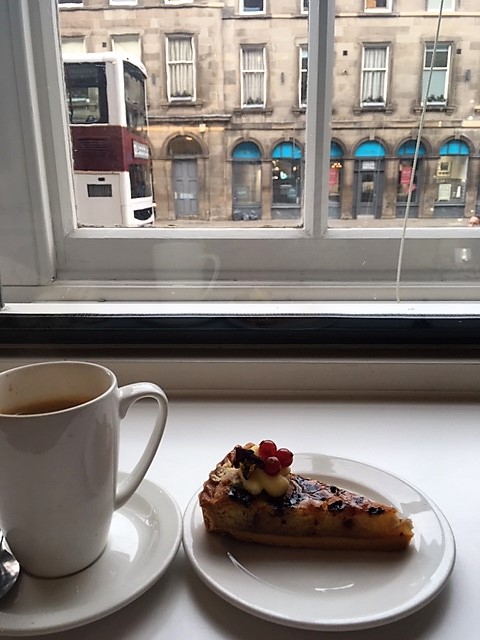Every time I make coffee on a cold afternoon, my mother stands next to me. We watch the first splash of boiling water dampen the paper cone and soften the grains of coffee. Our shared breath breathes in the winter aroma. We wait patiently to pour more water, tempering our eagerness.
And I see my mother, gone so long now, standing in my childhood’s turquoise kitchen. She is letting me “help” serve dessert at a dinner party. In the middle of the kitchen table, a round platter holds a ginger brown cake that has been dusted with a flurry of soft, white sugar. Mamma heats the silver coffee pot with scalding water then empties it again. Soon, the surge of hot coffee fills the gleaming container like the will to life. In the dining room, she pours its black heat into delicate cups, and tiny wisps of vapor rise over the winter tablecloth. Candle wax has overflowed into puddles on the fabric. I want to dip my fingers into its warmth and feel the wax form stiffly to my fingertips. But I don’t. Being Mamma’s helper means being allowed to watch her—close enough to touch her, but not moving at all.
A kettle sings fresh steam into our kitchens. The skin of my face tingles with my mother’s tension about how to make everything, always, just right.
And I miss her. The sadness drips, drips, drips. But I’m with her all the time. Every time I smell coffee, every time I doubt myself, and every time I cook a meal. I miss her food–fish cooked into so many different forms and flavors that it expands its skins, dives past its limits. I crave the long, white scar on her left elbow, marking where she fell onto an Icelandic country road from the over-sized frame of her brother’s bicycle. I seek out her mingled scents of cigarette smoke and Chanel perfume. I perceive in myself her outward gaze and her habitual remove.
I want her back, but she’s right here.
I see her everywhere when I go to Europe, in the dignified elegance of the dark-haired women who withstand the unflinching north wind, who wear wide silk scarves and line their lips in red. I see her small feet in every shoe store, and I watch her firmly set mouth as she considers something, then decides. I see my mother in the shape of every island. All fishing villages are hers. All forbidden romances are hers, and every mental illness.
A year ago, on the tram sliding into Edinburgh, my mind buzzed with excitement about a new city, about solitude, about seeing my son. And it washed over me like warm light, a zephyr, how much my mother loved me! I saw her sparkle of joy every time I showed up at her house with or without my little boys. I saw how happy it made her to see me and how far she came to be with me. I sat on that train and remembered the long dazzling years of her health and sobriety. I gave thanks for the hours of travel I’d taken on to savor a seafood extravaganza for my middle boy’s 24th birthday, just to have time together. And the tram floats along the track. Soon, Mom gets on and sits down next to me. She takes my hand and presses it to her heart. We sit quietly as roads and fields turn to old stone walls and a castle comes into view on the hillside.

11 replies on “Coffee with Mamma”
This is a prose poem, replete with shimmering images, and is how I experience my mother, as so many of us must, her influence and presence always nearby, in how I move in the kitchen, in my life, though she’s been gone now for years.
LikeLike
The essence of my mother is with me also–even more so near the holidays–and she would have turned 104 years 2 days ago.
Your writing is so enveloped in senses, so eloquent, so touching. Thank you, Jenny Lynn.
LikeLike
She was here not so long ago, Ruth! Thanks for reading, and for feeling all this.
LikeLike
Svo fallegt !
LikeLike
Tak fyrir, Sigga mín!
LikeLike
Making me cry Jenny Lynn!
LikeLike
Hugs, and coffee together soon!
LikeLike
Same
LikeLike
I am so deeply moved by this. Sending lots of love.
LikeLike
Coffee never tasted so good. Beautiful! ❤️
LikeLike
💜
LikeLike